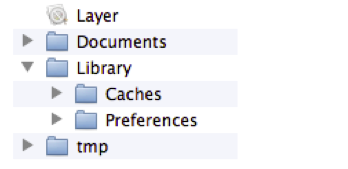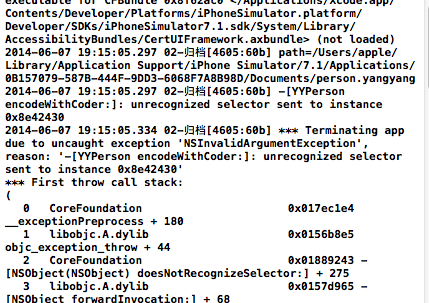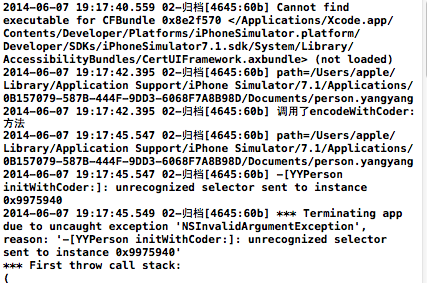XML属性列表-plist
一、应用沙盒
每个iOS应用都有⾃己的应⽤沙盒(应用沙盒就是文件系统目录),与其他文件系统隔离。应⽤必须待在⾃己的沙盒里,其他应用不能访问该沙盒(提示:在IOS8中已经开放访问)
应⽤沙盒的文件系统⽬录,如下图所示(假设应用的名称叫Layer)

模拟器应⽤用沙盒的根路径在: (apple是⽤用户名, 7.0是模拟器版本) /Users/apple/Library/Application Support/iPhone Simulator/7.0/Applications
二、应用沙盒结构分析
应⽤程序包:(上图中的Layer)包含了所有的资源文件和可执行文件
Documents:保存应⽤运行时生成的需要持久化的数据,iTunes同步设备时会备份该目录。例如,游戏应用可将游戏存档保存在该目录
tmp:保存应⽤运行时所需的临时数据,使⽤完毕后再将相应的文件从该目录删除。应用没有运行时,系统也可能会清除该目录下的文件。iTunes同步设备时 不会备份该目录
Library/Caches:保存应用运行时⽣成的需要持久化的数据,iTunes同步设备时不会备份该目录。⼀一般存储体积大、不需要备份的非重要数据
Library/Preference:保存应用的所有偏好设置,iOS的Settings(设置) 应⽤会在该⺫录中查找应⽤的设置信息。iTunes同步设备时会备份该目录
三、应用沙盒常见的获取方式
沙盒根目录:NSString *home = NSHomeDirectory();
Documents:(2种⽅方式)
利用沙盒根目录拼接”Documents”字符串
复制代码 代码如下:
NSString *home = NSHomeDirectory();
NSString *documents = [home stringByAppendingPathComponent:@"Documents"]; // 不建议采用,因为新版本的操作系统可能会修改目录名
利用NSSearchPathForDirectoriesInDomains函数
复制代码 代码如下:
// NSUserDomainMask 代表从用户文件夹下找
// YES 代表展开路径中的波浪字符“~”
NSArray *array = NSSearchPathForDirectoriesInDomains(NSDocumentDirectory, NSUserDomainMask, NO); // 在iOS中,只有一个目录跟传入的参数匹配,所以这个集合里面只有一个元素
NSString *documents = [array objectAtIndex:0];
tmp:NSString *tmp = NSTemporaryDirectory();
Library/Caches:(跟Documents类似的2种⽅方法)
利用沙盒根目录拼接”Caches”字符串
利⽤NSSearchPathForDirectoriesInDomains函数(将函数的第2个参数改 为:NSCachesDirectory即可)
Library/Preference:通过NSUserDefaults类存取该目录下的设置信息
相应的代码:
复制代码 代码如下:
#import "NJViewController.h"
#import "NJPerson.h"
@interface NJViewController ()
- (IBAction)saveDataBtnClick:(id)sender;
- (IBAction)readDataBtnClick:(id)sender;
@end
复制代码 代码如下:
@implementation NJViewController
/**
* 点击保存按钮
*/
- (IBAction)saveDataBtnClick:(id)sender {
// youtube做法
// NSString *path = @"/Users/apple/Library/Application Support/iPhone Simulator/7.1/Applications/A6D53E11-DDF0-4392-B2D4-FE77A96888A6/Documents/abc.plist";
// 获取应用程序根目录
NSString *home = NSHomeDirectory();
// 不建议写/
//NSString *path = [home stringByAppendingString:@"/Documents"];
// 不建议Documents写死
//NSString *path = [home stringByAppendingPathComponent:@"Documents"];
// NSUserDomainMask 在用户目录下查找
// YES 代表用户目录的~
// NSDocumentDirectory 查找Documents文件夹
// 建议使用如下方法动态获取
NSString *doc = [NSSearchPathForDirectoriesInDomains(NSDocumentDirectory, NSUserDomainMask, YES) lastObject];
// 拼接文件路径
NSString *path = [doc stringByAppendingPathComponent:@"abc.plist"];
NSLog(@"%@", path);
//NSArray *arr = @[@"lnj", @"28"];
//[arr writeToFile:path atomically:YES];
// NSDictionary *dict = @{@"name": @"lnj", @"age":@"28"};
// 调用writeToFile将数据写入文件
// [dict writeToFile:path atomically:YES];
/*
plist只能存储系统自带的一些常规的类, 也就是有writeToFile方法的对象才可以使用plist保存数据
字符串/字典/数据/NSNumber/NSData ...
*/
// 自定义的对象不能保存到plist中
NJPerson *p = [[NJPerson alloc] init];
p.name =@"lnj";
NSDictionary *dict = @{@"person": @"abc"};
[dict writeToFile:path atomically:YES];
}
/**
* 点击读取按钮
*/
- (IBAction)readDataBtnClick:(id)sender {
NSString *doc = [NSSearchPathForDirectoriesInDomains(NSDocumentDirectory, NSUserDomainMask, YES) lastObject];
NSString *path = [doc stringByAppendingPathComponent:@"abc.plist"]
;
// 读取数据
NSDictionary *dict = [NSDictionary dictionaryWithContentsOfFile:path];
NSLog(@"%@", dict);
}
@end
四、属性列表
属性列表是一种XML格式的文件,拓展名为plist
如果对象是NSString、NSDictionary、NSArray、NSData、 NSNumber等类型,就可以使用writeToFile:atomically:⽅法 直接将对象写到属性列表文件中
NSKeydeArchiver归档
一、简单说明
在使用plist进行数据存储和读取,只适用于系统自带的一些常用类型才能用,且必须先获取路径相对麻烦;
偏好设置(将所有的东西都保存在同一个文件夹下面,且主要用于存储应用的设置信息)
归档:因为前两者都有一个致命的缺陷,只能存储常用的类型。归档可以实现把自定义的对象存放在文件中。
二、代码示例
1.文件结构

复制代码 代码如下:
//
// YYViewController.m
// 02-归档
//
// Created by apple on 14-6-7.
// Copyright (c) 2014年 itcase. All rights reserved.
//
#import "YYViewController.h"
#import "YYPerson.h"
@interface YYViewController ()
- (IBAction)saveBtnOnclick:(id)sender;
- (IBAction)readBtnOnclick:(id)sender;
@end
复制代码 代码如下:
@implementation YYViewController
- (void)viewDidLoad
{
[super viewDidLoad];
}
- (IBAction)saveBtnOnclick:(id)sender {
//1.创建对象
YYPerson *p=[[YYPerson alloc]init];
p.name=@"文顶顶";
p.age=23;
p.height=1.7;
//2.获取文件路径
NSString *docPath=[NSSearchPathForDirectoriesInDomains(NSDocumentDirectory, NSUserDomainMask, YES)lastObject];
NSString *path=[docPath stringByAppendingPathComponent:@"person.yangyang"];
NSLog(@"path=%@",path);
//3.将自定义的对象保存到文件中
[NSKeyedArchiver archiveRootObject:p toFile:path];
}
- (IBAction)readBtnOnclick:(id)sender {
//1.获取文件路径
NSString *docPath=[NSSearchPathForDirectoriesInDomains(NSDocumentDirectory, NSUserDomainMask, YES)lastObject];
NSString *path=[docPath stringByAppendingPathComponent:@"person.yangyang"];
NSLog(@"path=%@",path);
//2.从文件中读取对象
YYPerson *p=[NSKeyedUnarchiver unarchiveObjectWithFile:path];
NSLog(@"%@,%d,%.1f",p.name,p.age,p.height);
}
@end
新建一个person类
YYPerson.h文件
复制代码 代码如下:
//
// YYPerson.h
// 02-归档
//
// Created by apple on 14-6-7.
// Copyright (c) 2014年 itcase. All rights reserved.
//
#import <Foundation/Foundation.h>
// 如果想将一个自定义对象保存到文件中必须实现NSCoding协议
@interface YYPerson : NSObject<NSCoding>
//姓名
@property(nonatomic,copy)NSString *name;
//年龄
@property(nonatomic,assign)int age;
//身高
@property(nonatomic,assign)double height;
@end
YYPerson.m文件
复制代码 代码如下:
//
// YYPerson.m
// 02-归档
//
// Created by apple on 14-6-7.
// Copyright (c) 2014年 itcase. All rights reserved.
//
#import "YYPerson.h"
@implementation YYPerson
// 当将一个自定义对象保存到文件的时候就会调用该方法
// 在该方法中说明如何存储自定义对象的属性
// 也就说在该方法中说清楚存储自定义对象的哪些属性
-(void)encodeWithCoder:(NSCoder *)aCoder
{
NSLog(@"调用了encodeWithCoder:方法");
[aCoder encodeObject:self.name forKey:@"name"];
[aCoder encodeInteger:self.age forKey:@"age"];
[aCoder encodeDouble:self.height forKey:@"height"];
}
// 当从文件中读取一个对象的时候就会调用该方法
// 在该方法中说明如何读取保存在文件中的对象
// 也就是说在该方法中说清楚怎么读取文件中的对象
-(id)initWithCoder:(NSCoder *)aDecoder
{
NSLog(@"调用了initWithCoder:方法");
//注意:在构造方法中需要先初始化父类的方法
if (self=[super init]) {
self.name=[aDecoder decodeObjectForKey:@"name"];
self.age=[aDecoder decodeIntegerForKey:@"age"];
self.height=[aDecoder decodeDoubleForKey:@"height"];
}
return self;
}
@end
3.打印效果和两个重要的错误提示
点击保存按钮和读取按钮,成功打印结果如下:

关于不实现两个协议方法的错误提示:
-(void)encodeWithCoder:(NSCoder *)aCoder方法:

-(id)initWithCoder:(NSCoder *)aDecoder方法:

三、继承类中的使用
新建一个学生类,让这个类继承自Preson这个类,增加一个体重的属性。
YYstudent.h文件
复制代码 代码如下:
//
// YYstudent.h
// 02-归档
//
// Created by apple on 14-6-7.
// Copyright (c) 2014年 itcase. All rights reserved.
//
#import "YYPerson.h"
@interface YYstudent : YYPerson
//增加一个体重属性
@property(nonatomic,assign) double weight;
@end
YYstudent.m文件
复制代码 代码如下:
//
// YYstudent.m
// 02-归档
//
// Created by apple on 14-6-7.
// Copyright (c) 2014年 itcase. All rights reserved.
//
#import "YYstudent.h"
@implementation YYstudent
//在子类中重写这两个方法
- (void)encodeWithCoder:(NSCoder *)aCoder
{
[super encodeWithCoder:aCoder];
NSLog(@"调用了YYStudent encodeWithCoder");
[aCoder encodeFloat:self.weight forKey:@"weight"];
}
- (id)initWithCoder:(NSCoder *)aDecoder
{
if (self = [super initWithCoder:aDecoder]) {
NSLog(@"调用了YYstudent initWithCoder");
self.weight = [aDecoder decodeFloatForKey:@"weight"];
}
return self;
}
@end
YYViewController.m文件
复制代码 代码如下:
//
// YYViewController.m
// 02-归档
//
// Created by apple on 14-6-7.
// Copyright (c) 2014年 itcase. All rights reserved.
//
#import "YYViewController.h"
#import "YYPerson.h"
#import "YYstudent.h"
@interface YYViewController ()
- (IBAction)saveBtnOnclick:(id)sender;
- (IBAction)readBtnOnclick:(id)sender;
@end
复制代码 代码如下:
@implementation YYViewController
- (void)viewDidLoad
{
[super viewDidLoad];
}
- (IBAction)saveBtnOnclick:(id)sender {
//1.创建对象
// YYPerson *p=[[YYPerson alloc]init];
// p.name=@"文顶顶";
// p.age=23;
// p.height=1.7;
YYstudent *s=[[YYstudent alloc]init];
s.name=@"wendingding";
s.age=23;
s.height=1.7;
s.weight=62;
//2.获取文件路径
NSString *docPath=[NSSearchPathForDirectoriesInDomains(NSDocumentDirectory, NSUserDomainMask, YES)lastObject];
NSString *path=[docPath stringByAppendingPathComponent:@"person.yangyang"];
NSLog(@"path=%@",path);
//3.将自定义的对象保存到文件中
// [NSKeyedArchiver archiveRootObject:p toFile:path];
[NSKeyedArchiver archiveRootObject:s toFile:path];
}
- (IBAction)readBtnOnclick:(id)sender {
//1.获取文件路径
NSString *docPath=[NSSearchPathForDirectoriesInDomains(NSDocumentDirectory, NSUserDomainMask, YES)lastObject];
NSString *path=[docPath stringByAppendingPathComponent:@"person.yangyang"];
NSLog(@"path=%@",path);
//2.从文件中读取对象
// YYPerson *p=[NSKeyedUnarchiver unarchiveObjectWithFile:path];
// NSLog(@"%@,%d,%.1f",p.name,p.age,p.height);
YYstudent *s=[NSKeyedUnarchiver unarchiveObjectWithFile:path];
NSLog(@"%@,%d,%.1f,%f",s.name,s.age,s.height,s.weight);
}
@end
点击保存按钮和读取按钮后的打印输出:

四、重要说明
1.保存数据过程:
复制代码 代码如下:
//1.创建对象
YYstudent *s=[[YYstudent alloc]init];
s.name=@"wendingding";
s.age=23;
s.height=1.7;
s.weight=62;
//2.获取文件路径
NSString *docPath=[NSSearchPathForDirectoriesInDomains(NSDocumentDirectory, NSUserDomainMask, YES)lastObject];
NSString *path=[docPath stringByAppendingPathComponent:@"person.yangyang"];
NSLog(@"path=%@",path);
//3.将自定义的对象保存到文件中
[NSKeyedArchiver archiveRootObject:s toFile:path];
2.读取数据过程:
复制代码 代码如下:
//1.获取文件路径
NSString *docPath=[NSSearchPathForDirectoriesInDomains(NSDocumentDirectory, NSUserDomainMask, YES)lastObject];
NSString *path=[docPath stringByAppendingPathComponent:@"person.yangyang"];
//2.从文件中读取对象
YYstudent *s=[NSKeyedUnarchiver unarchiveObjectWithFile:path];
3.遵守NSCoding协议,并实现该协议中的两个方法。
4.如果是继承,则子类一定要重写那两个方法。因为person的子类在存取的时候,会去子类中去找调用的方法,没找到那么它就去父类中找,所以最后保存和读取的时候新增加的属性会被忽略。需要先调用父类的方法,先初始化父类的,再初始化子类的。
5.保存数据的文件的后缀名可以随意命名。
6.通过plist保存的数据是直接显示的,不安全。通过归档方法保存的数据在文件中打开是乱码的,更安全。
【深入讲解iOS开发中应用数据的存储方式】相关文章:
★ iOS开发中使用Quartz2D绘制上下文栈和矩阵的方法
